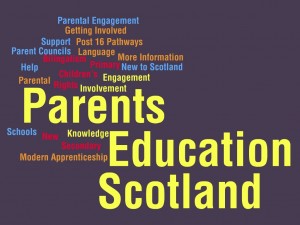
 As the Gathered Together project comes to an end we have been trying to capture all the good practice we’ve heard about. Yesterday we managed to meet with Karen Hartnup from Leith Walk Primary Parent Council in Edinburgh over a coffee to hear more about the book project they had run.
As the Gathered Together project comes to an end we have been trying to capture all the good practice we’ve heard about. Yesterday we managed to meet with Karen Hartnup from Leith Walk Primary Parent Council in Edinburgh over a coffee to hear more about the book project they had run.
Leith Walk Primary is a very diverse school- there were 41 different languages at the time that the Parent Council ran the book project in 2015 including Polish, Hindi, Urdu, Punjabi, Spanish, Portuguese, Arabic and Mandarin. Many of the parents in the school wanted their children to keep using the home language but found it difficult to find books in their own language, particularly for older children. Leith Walk Primary Parent Council felt that this was an opportunity for them to engage with the diverse parents and support them to be able to help their children’s learning.
The area of Leith has an event called £eith decides, where people who live and work in the local community have the opportunity to decide how a pot of money should be spent. All the organisations who are applying for funding let the local people know what their plan is and anyone aged 8 or older can vote for their favourite project. To get as many votes for the book project as possible, the Parent Council created multilingual posters with the word “book” written in all the languages of the school; they also went out into the playground and spoke to parents- letting parents who spoke English as an additional language know that their home language was respected at the school. The campaign was successful and the Parent Council got £1,000 from £eith decides.
 After securing the funding, the Parent Council started consulting with parents about what books to buy- parents shared favourite stories from their childhood, suggested things that their children were interested in and were able to let the Parent Council know if a translation was actually any good. It was an empowering experience where the EM parents were the experts and they could see the PC responding to their suggestions. Accessing books in other languages is often difficult- postage and packing cost twice as much as the books themselves and some of the books parents suggested from their own childhood were simply out of print. To help in accessing the books, the Parent Council teamed up with the local library and Bilingualism Matters. The books were put on display at the MacDonald road library near the school for parents to come along and see the books (and let the Parent Council know if they were good versions) and the community learning and development team promoted the event to the families they were working with.
After securing the funding, the Parent Council started consulting with parents about what books to buy- parents shared favourite stories from their childhood, suggested things that their children were interested in and were able to let the Parent Council know if a translation was actually any good. It was an empowering experience where the EM parents were the experts and they could see the PC responding to their suggestions. Accessing books in other languages is often difficult- postage and packing cost twice as much as the books themselves and some of the books parents suggested from their own childhood were simply out of print. To help in accessing the books, the Parent Council teamed up with the local library and Bilingualism Matters. The books were put on display at the MacDonald road library near the school for parents to come along and see the books (and let the Parent Council know if they were good versions) and the community learning and development team promoted the event to the families they were working with.
Leith Walk Primary has a regular Friday bake-sale. At one of these the Parent Council showed the new books to give parents the opportunity to see the resources that were available and how their suggestions had been acted on. One of the most common questions from seeing the books was “where can we buy these?”, so the Parent Council approached a local bookshop and suggested they stock children’s books in the languages spoken in the community. The bookshop will have a stall at the school’s multi-cultural fair later in the year, giving parents the chance to buy books for themselves.
Leith Walk Primary now has a growing multi-lingual library, it’s in regular use and one Spanish parent spoke about her joy the first day her daughter brought back a book in Spanish so they could read it together. It’s made the local library realise they need to make it easier for families to find books in their own language and they are creating online lists of all the books they have in particular languages. For Karen, the book project has given her a lot of new friends- the parents who gave her advice and ideas for books to source. The parents who are new to Scotland were really excited by the project and it showed them that their culture and language is valued and a part of the school. In the feedback one parent said
Thank you for … your BIG work on finding bilingual books for kids in our school- it is really important for them to have the storybook on their mother language.
A few weeks ago we were invited to join Stirling Council’s English as an Additional Language teachers Tricia Davenport and David Fletcher for an information session for new parents about Scottish Education. The session was a whistle stop tour of the schools system in Scotland that answered a lot of questions and helped me to finally understand how the new exam system works. Among the questions answered were:
We know from our work with parents who are new to Scotland that they have a lot of questions about the education system. From the fact that children in the UK start school age 5 (unlike many European countries where children don’t start formal education until they are 6 or 7) to the lack of formal testing in primary school there are big differences between parents’ own experience of school and the way their children are being taught. Information events like the one I attended in Stirling are vital as they give parents the opportunity to ask questions and understand how things work in Scotland. To make sure that the parents fully understood the session translators were provided including two sixth year pupils (from China and Poland). Tricia and David helped them to prepare before the session and both the young interpreters sat with a parent and explained what was being said by the presenter. As well as making sure that the parents were given the information in their own language the student interpreters will get certificates recognising their work. By giving them the chance to use their linguistic skills the EAL service was showing them the value of speaking two languages and to recognise what a gift bilingualism is.
Reaching out and engaging with these families can make a huge difference and give them reassurance and a sense of belonging. As David said, “We realise how traumatic it can be for families who move to a new education system, and there can be significant differences between education in Scotland and in other countries. These sessions are a good opportunity to meet parents in an informal setting, to discuss concerns and questions.”
A huge thanks to everyone who came along to our seminar at the Scottish Learning Festival yesterday. It was great to have the opportunity to share the learning from the Scotland, People and Language Forum we held in February with new people and highlight some of the issues that were raised in the Forum. One of the points that people had raised was the importance of having resources and that these resources were being used- if bilingual books aren’t being borrowed a library won’t reorder them. In our briefing papers we have identified some great resources around language learning- including information about supporting bilingual learners, an introduction to the 1+2 Approach and sites that selling dual language books.
In preparing for this seminar we asked people to share their good practice in celebrating language diversity and got some fabulous ideas back including the work of James Gilespies primary school in Edinburgh where “The Gruffalo” was read in 14 languages! We would really like to hear more about what you are doing to celebrate the languages in your schools and communities- please share your ideas
Your can read the full report from the Scotland People and Language Forum here or click here to see our presentation
You can read the briefing papers we created for the seminar

We asked 164 parents from ethnic minorities about the Scottish Education system and their children’s school – 73% did not know what the Curriculum for Excellence was.
Gathered Together are putting together a series of workshops to help parents understand and be more involved in their children’s education and what happens in schools.
We will work with the experts in each field to help those parents who are new to Scotland or those who have grown up in a different education system to help explain different stages and aspects of education.
Our partners will include:
Each of the six workshops will be run in both Edinburgh and Glasgow from 10.30-12.30pm. (For details about individual sessions go to our events page)
Places are limited so please book your place as soon as possible by filling out the registration form at the link below:
https://www.surveymonkey.com/s/JC5PRV9
| Workshop | Glasgow Adelphi Centre |
Edinburgh Quaker Meeting House |
|---|---|---|
| Primary School Information | 30 September | 1 October |
| Secondary School Information | 7 October | 8 October |
| Post 16 Education and Choices | 21 October | 22 October |
| Parental involvement and engagement | 28 October | 29 October |
| Mother tongue- at home and school | 4 November | 5 November |
| Children’s Rights in Scotland | 11 November | 12 November |
Lorna Anderson, an English as an Additional Language teacher based in Glasgow, has taken time out from her dissertation writing and written a blog for us about her work with the families of the children she supports.
I have recently completed the Post Graduate Certificate in Supporting Bilingual Learners in the Mainstream Classroom. We had to carry out a project that addressed concerns we had around supporting EAL learners. Where I worked at the time, parents with limited English language rarely engaged with the school. I talked to these parents at parents’ night and found that they lacked confidence and didn’t believe they could be involved in their child’s learning due to the language barrier. Supporting their children with homework was the biggest issue, as it was generally the traditional tasks such as spelling and writing sentences. Parents prioritised their child’s ability to use English and placed little value on their own first language. I decided to run a series of workshops, with help from interpreters, for these parents on supporting their children with homework. I focused very much on the positives, what parents could do to help.
Firstly, we looked at the reading books that went home and the types of literacy skills they could develop with them using the visuals – regardless of what language the words were written in; skills such as making predictions, recounting the story, speculating and sequencing. I emphasised that developing the ability to make reasoned predictions, for example, is the same skill no matter what language it is in, and that research had proven that you can transfer concepts to a second language effectively if they are embedded in the first. We practiced asking good questions, and the children had the opportunity to come and work with their parent(s) on the aspect we had been looking at that day.
Secondly, it was important to emphasise the value of maintaining first language at home. I made up a series of story packs, which contained a dual language story with supporting games and props. Parents could use these in the same way as the homework reading books to develop literacy skills, plus use the dual language text to share stories and talk about them together at home. These were loaned out weekly and swapped for a new one the following. They were a great success, and very popular with both parents and children!
The parents all said they felt much more confident at the end of the project and were very grateful for the support. Some of them came into school later that year to read stories in their own languages to different classes – something they said they wouldn’t have even considered before. That was the best outcome I could have hoped for!